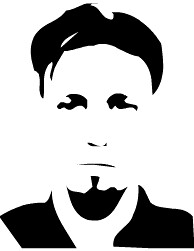copyleftist :: steal this post

I was first exposed to the idea of copyleft at the FILE 2003 symposium in Sao Paulo, Brazil. I heard arguments in favor of "intellectual generosity" as an alternative to "intellectual property". A Brazilian band was giving away their CD that included songs with could be separated into individual tracks (drums, bass, guitar, keys, and vocals) so that "fans" could freely remix the music and redistribute in any way they saw fit (precursor to creative commons?). There was an argument and social justification that all information in any form should be free. On the streets of Sao Paulo it was immediately clear that was what was happening anyway as you could purchase bootleg and pirated information (software, dvd, video games) from vendors for next to nothing. At first I could not believe the complete disregard for copyright until I went into "legitimate" stores and found that legal copies (as well as the technology) of the same items were overpriced ($75 for a PS2 game that sells for $50 in the US -factor in the value of the Real to the dollar and you will see the digital divide turn into the Valles Marineris).
I recently had the privilege of a discussion on the ethics of copyright with execs from Viacom (via teleconference). We discussed the nuances and implications of the Grokster vs. MGM Supreme Court ruling. Viacom, obviously on the side of the copyright holders, was suprisingly sensitive to the overzealousness of copyright laws that were lobbied by content providers. They saw no problem with small scale file sharing (for example I purchase a music cd and burn a copy for my sister), and admitted the laws are in place to impede large scale piracy (I make the same cd available to 1 million of my closest friends). There is an interesting case involving a lawsuit against Apple Computer for restricting the uses of legally purchased downloads from iTunes (Fairplay). I agree that current copyright law is archaic and unfairly favors corporations. Consumers will not tolerate unfounded restrictions on their legally purchased information in any form. More importantly, they don't want to feel like they are breaking the law from reasonable uses (god forbid I put software that I purchase on more than one of my own machines).
I am a culture jammer, I believe in the neccesity of transgression. My artwork depends on the ability to remix, manipulate, change (sometimes even fuck-up) popular culture imagery and iconography in any form (text, image, design, sound, video, social software) and redistribute it so that it may be discussed then remixed, manipulated and redistributed by someone else. The role of the artist is to be the conscious of the culture, even if this is at odds with corporations (and their lawyers) and THEIR laws.
I am a copyleftist.


0 Comments:
Post a Comment
<< Home